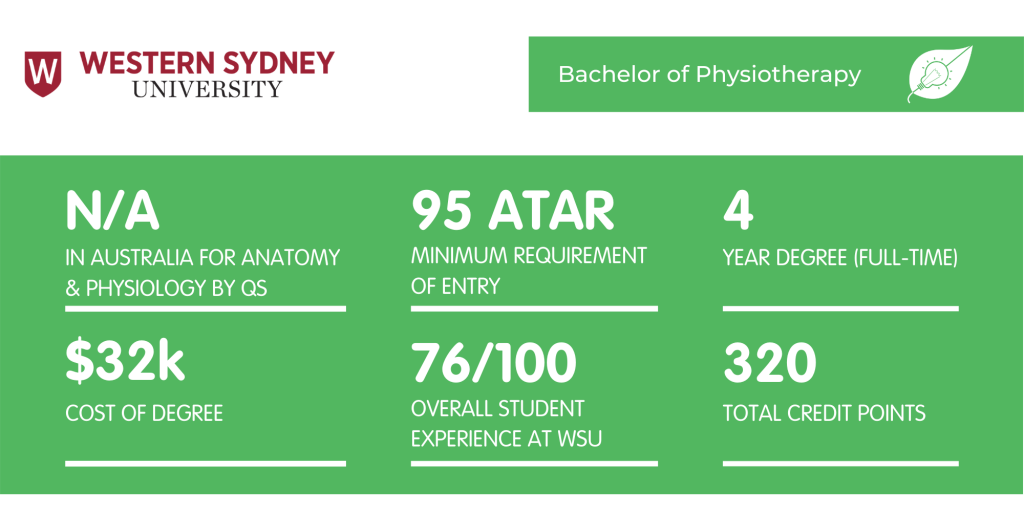
Interested in studying WSU Physiotherapy, but aren’t sure about what it requires?
Well, here’s everything you need to know about this degree at Western Sydney University. From assessments to faculty culture, we’ve got you covered!
So, let’s jump into it!
What is a Bachelor of Physiotherapy at WSU?
Core Units for this Degree
How to Get into a Bachelor of Physiotherapy at WSU
What’s the Teaching Format?
What’s the Faculty and Culture Like?
What is a Bachelor of Physiotherapy at WSU?
Like the name suggests, a Bachelor of Physiotherapy at WSU involves a lot of anatomy and developing an understanding of the human body. You can also expect a bit of biology and chemistry through this degree and you’ll also learn about the ethics surrounding how you deal with patients and the ethical practices of being a physiotherapist.
A Bachelor of Physiotherapy at WSU is a four year degree, and with this degree you are able to gain the qualification of a Physiotherapist without any further study! Though, if you choose to only complete three years of the degree, you may graduate with the qualification of a Bachelor of Health Science instead.
Honours
An Honours program is provided within the four years of this degree to students who are completing the course at a high standard. Application to Honours is open in the third year of the degree where you’ll complete training and research in the second semester.
Throughout the fourth, and final year, of Physiotherapy at WSU, you’ll be able to undertake clinical placements (or work experience) and complete an Honours thesis which focuses on real world problems in physiotherapy.
Career Paths
As for career paths, there are a range of health professions you can enter aside from being a physiotherapist. For instance, you might find yourself working in roles such as a health service manager, sports therapist or personal trainer.
However, being such a specific degree, most graduates will become a physiotherapist. It doesn’t stop here though — there are a range of specialisations you can undertake in the industry, including:
-
- A musculoskeletal physiotherapist
- A respiratory physiotherapist
- An aged care physiotherapist
- A paediatric physiotherapist
- A sports physiotherapist
- A dance and gymnastics physiotherapist
Core Units for this Degree
If you’re completing a Bachelor of Physiotherapy at WSU, you can expect to take subjects that include a mixture of anatomy, biology and chemistry. HAAP 1 and HAAP 2 are Human Anatomy and Physiology subjects which give you a broad overview on the human body and functional anatomy.
You will also have to take a unit on ethics, where you learn about how to deal with patients and communicate effectively.
Something to keep in mind is that this degree doesn’t provide you with much flexibility, in that all subjects have been selected for students — there aren’t any electives. The degree basically consists of only compulsory units that you’ll need to complete in order to graduate from the degree.
Are there any majors?
As physiotherapy is already a particularly niche field, there are no majors for this course. However, there are a range of specialisations that you can choose to focus on.

Placements
Speaking of placements, Physiotherapy at WSU provides you with work experience in the third and fourth years of the degree. These clinical placements will provide you with the chance to apply your practical skills in a real world setting, and of course, gain experience.
How to Get into Physiotherapy at WSU
A Bachelor of Physiotherapy at WSU requires an ATAR of 95 for guaranteed entry. Although there are no prerequisites for Physiotherapy at WSU, Chemistry, Biology and PDHPE are listed as recommended studies.
It is also important to note that Physiotherapy is a Health and Welfare course, which means that you must obtain a Criminal Record Check and Health Employment-Related check, in order to meet the course admission requirements.
Pathways and Scholarships
There are a number of entry pathways and scholarships that can get you into a Bachelor of Physiotherapy at WSU.
A popular entry program is the HSC True Reward Early Offer Program, which is available to all domestic students. You may also be interested in the Global Leaders Program at WSU which includes a $2000 scholarship and a sponsored university travel experience.
To encourage you in maintaining a high standard GPA (grade point average), Physiotherapy at WSU provides you with the benefit of access to extra utilities on campus. Further, if you can maintain a high GPA throughout the four year course, you can be awarded a full scholarship to continue further studies in Physiotherapy at WSU.
You can also use this scholarship search tool to find out more about what WSU has to offer!
What’s the Teaching Format?
Physiotherapy at WSU runs in a semester format, and is only available at the Campbelltown campus. On a full-time load, you’ll take 4 subjects a semester and each subject will have tutorials and lectures, while some may also have practical classes.
Class Structure

Lectures
Within lectures, there’ll normally be around 100 students attending. These classes are mainly for lecturers to deliver course content that will inform other classes, like tutes and practicals.
Tutorials
These are much smaller classes of about 20 students and are heavily aligned with lecture content — so make sure you’re paying attention! Tutes also involve a lot of discussion of the content with other class members; if you really want to engage and make the most of these classes, you should do your best to participate.
“Tutorials were smaller classes which allowed us to have more discussions, whereas in the lecture we’re learning content by ourselves.” — Jing Chen
Practicals
Pracs are even smaller than tutes, with only around 15 students. These give you the opportunity to apply the content you’ve learnt in a more engaging and interactive environment, under the guidance of your tutor!
“The practicals were really helpful. I learnt how to communicate with others and see what it’s like to be a physiotherapist in person, because that is the experience that the practical is meant to give.” — Jing Chen
How much time do you spend at uni?
When studying Physiotherapy at WSU, you can expect to have around 12 to 15 contact hours a week, as you’ll have practical classes on top of lectures and tutorials. Don’t forget, you’ll need to make time to complete any homework, assessments or revision of content!
What are the assessments like?
As for assessments, you can expect a good mixture of exams and assignments in this degree. You will often be assigned weekly quizzes that are worth a small percentage of your grade, and final exams.
Some of the assignments you get will involve individual work, like creating a poster or infographic, whilst other assignments are group tasks, like role plays and presentations — so there’ll always be some variety when you’re assessed.
Skills That You Develop

Physiotherapy at WSU teaches you a range of skills, both theory and practical based, that are needed to become a physiotherapist. You will learn about human anatomy, biology and chemistry, alongside ethical skills which are needed when working on patients.
As previously mentioned, you’ll develop your ability to communicate effectively with patients, which is absolutely essential in the field. This degree will also equip you with the ability to stay organised, so you’ll graduate with all the skills necessary to pursue a career in physiotherapy.
What’s the Faculty and Culture Like?
The teaching staff for Physiotherapy at WSU consists of mostly older tutors and lecturers who have a lot of experience in the industry.
“They’re definitely very approachable, very friendly, and all round very encouraging and motivated. I think they’re quite passionate in what they’re doing. My tutors are pretty cool and helpful!” — Jing Chen
Physiotherapy at WSU is said to have a really encouraging vibe, and you’re in a culturally diverse environment where everyone shares an interest in physiotherapy!
“Definitely a very supportive environment, and I’ve made friends so we can help each other out throughout the degree!” — Jing Chen
Societies
The WSU PhsyioSoc is the main society for Physiotherapy students, where you’re able to partake in networking events and a range of academic opportunities. PhysioSoc also runs first aid courses and volunteering opportunities.
You can find out more about PhysioSoc through their Facebook page!
Support Programs
PASS classes are also provided as an additional support program to make sure you don’t feel like you’re falling behind! PASS classes are essentially peer to peer sessions, where third and fourth years help out first year students studying Physiotherapy at WSU — these classes are really common for Anatomy subjects in particular.
Although the academic side of things are important in uni, WSU also has a range of counselling programs to support students’ mental health, particularly when it comes to dealing with the stress of uni, work and life.
Interested in the pros and cons of this degree? Check out our article here!
Nandini Dhir is a Content Writer at Art of Smart and is currently studying a Bachelor of Arts (majoring in Marketing) and a Bachelor of Advanced Studies (Media and Communications), as a Dalyell Scholar, at Sydney University. She enjoys covering local issues in her area and writing about current events in the media. Nandini has had one of her pieces published in an article with the Sydney Morning Herald. In her free time, Nandini loves doing calligraphy, ballet, and sewing, or is otherwise found coddling her cats.


